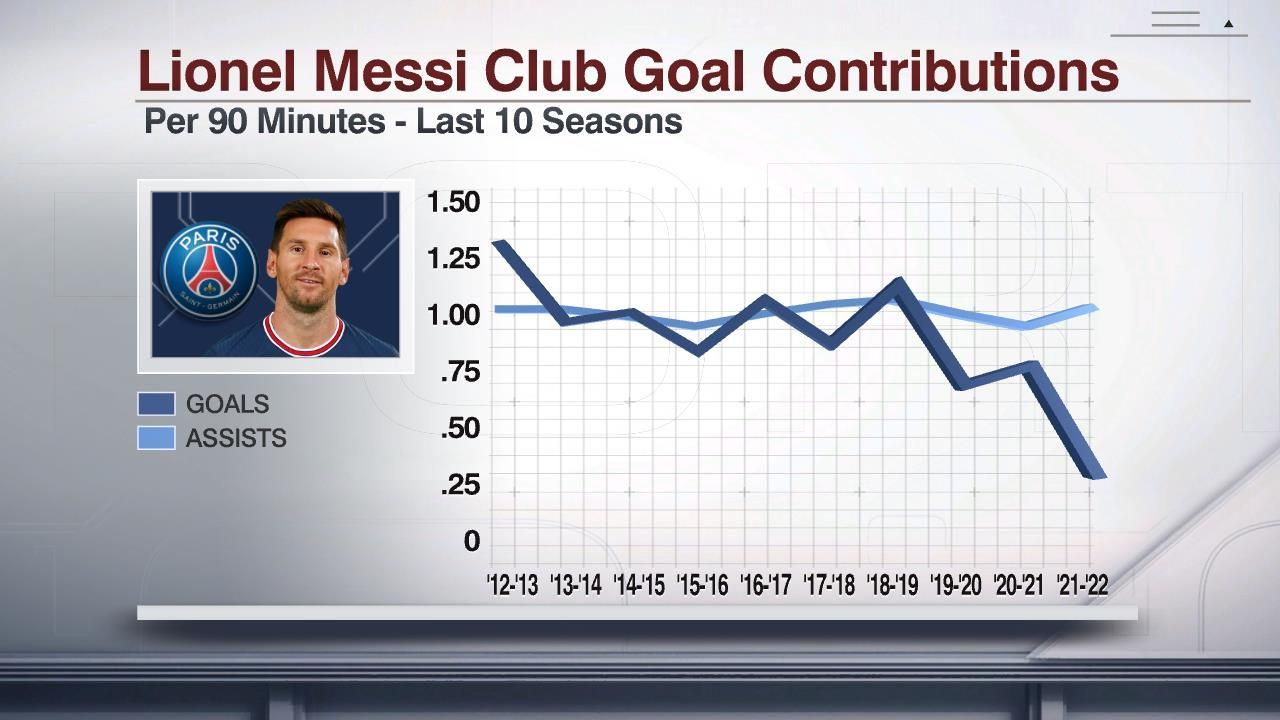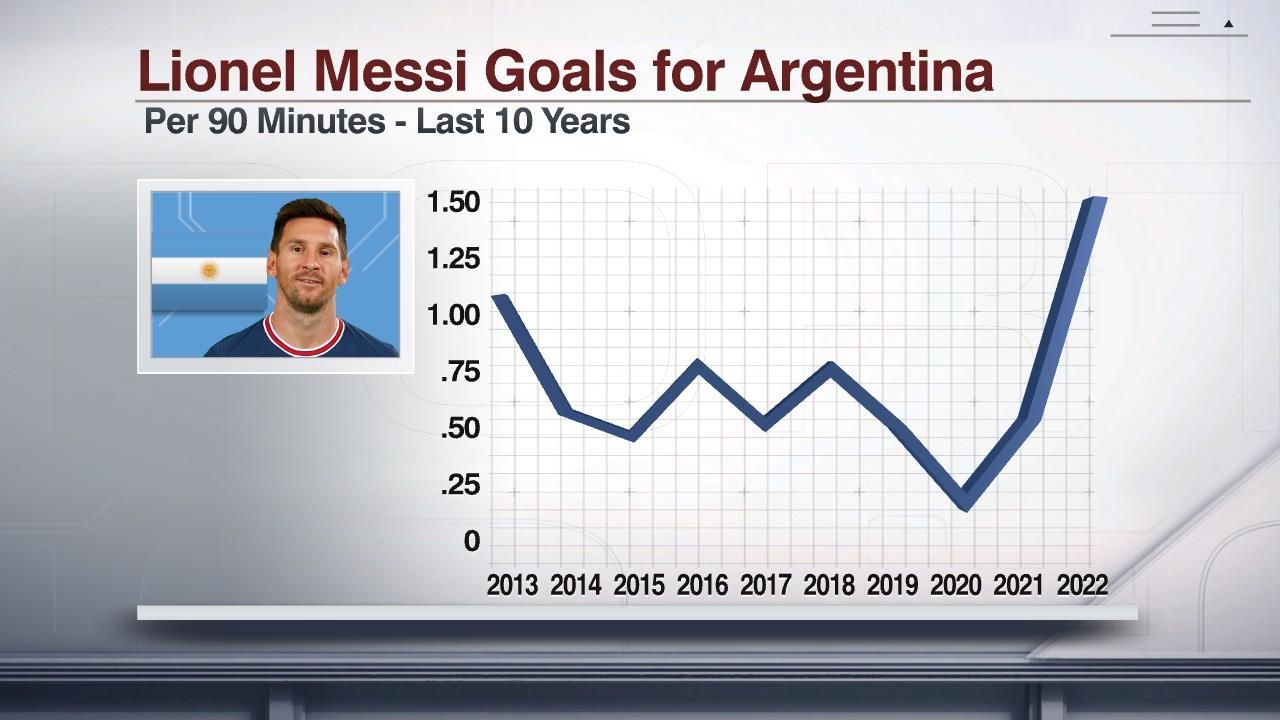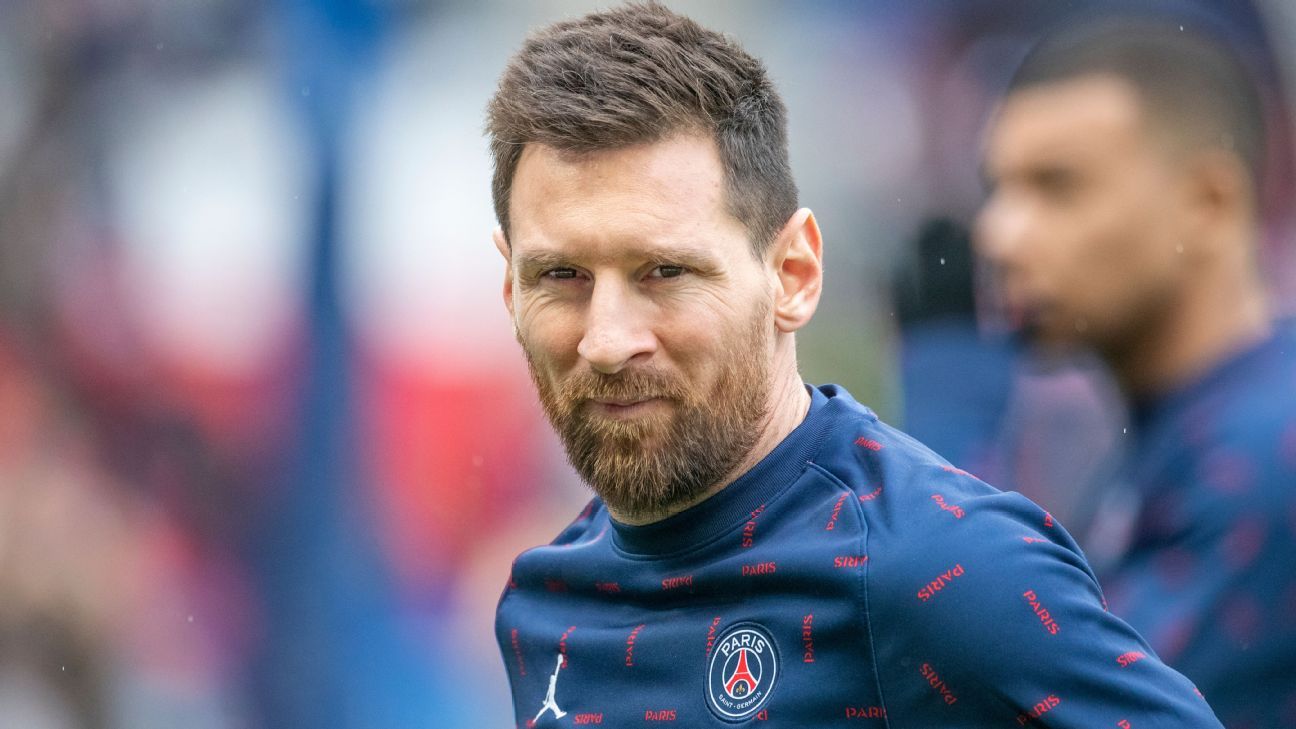Lionel Messi is celebrating his birthday on Friday as he turns 35.
Messi is also entering the final 12 months of his contract with Paris Saint-Germain (though the club have the option of adding another year) in what could prove to be a significant period as he starts to wind down his career.
Of course, there’s no specific reason to suggest that Messi is thinking about calling it quits at the highest level, but it stands to reason that given his age and contractual circumstance, there’s a possibility that 2022-23 might be his final season at a major European club.
So we thought we’d celebrate the Barcelona and Argentina legend’s big day by taking a look back at certain aspects of his incredible career to date; all he has achieved, all he has yet to achieve and even a few of the big milestones he may still pass.
– What does the future hold for Messi in 2023?
– Stream ESPN FC Daily on ESPN+ (U.S. only)
– Don’t have ESPN? Get instant access
Messi at PSG in 2021-22

Messi made a tearful move to PSG on a free transfer in August 2021 after Barcelona’s €1.2 billion debt prevented them from being able to offer him a new five-year contract.
Having only represented one club from the age of 13, the transfer sent ructions through football with many drawn to question whether a player of Messi’s gargantuan stature would be able to adapt to a new environment after so many years playing HIS way at HIS club.
While still far from poor form, Messi has struggled to match the formidably high output of his Barca pomp, registering the worst single-season scoring rate of his entire career in his inaugural campaign in Paris.
Messi scored 11 goals in 34 games in all competitions in 2021-22 and averaged 0.345 goals per 90 minutes at club level — his lowest return on record and worst since 2007-08 when he mustered a scoring rate of 0.43 goals per 90 mins (16 goals in 40 games) in what was an injury ravaged campaign for Barca.
However, it was better news on the assist front as Messi pitched in with 15 in all competitions, though all of them came in Ligue 1. This level is broadly consistent with his average assist rate (20 in all comps) over the course of his nine prior club seasons at Camp Nou.
Messi also managed to add a new trinket to his incredible trophy haul by winning the Ligue 1 title in his maiden season — the 35th major club honour of his career.
How Messi and Argentina are building towards 2022 World Cup

The next major tournament on Messi’s radar is the 2022 World Cup in Qatar which Argentina qualified for in good time, mathematically securing their place at the tournament with a 0-0 draw against rivals Brazil back in November 2021.
Ahead of the aforementioned CONMEBOL qualifier against Brazil, Argentina hadn’t lost a single match in 26 outings (a flawless run that dated back more than two years) and since that game, they have remained unbeaten in six further games into 2022.
Overall, Messi and teammates are on a 33-game unbeaten streak, having last lost a game in July 2019 when they were eliminated from the Copa America semifinals via a 2-0 defeat against eventual champions Brazil. And, in that time, Argentina managed to win the 2021 Copa America — their first major international honour in 28 years — by beating holders Brazil 1-0 in the final.
On an individual level, Messi has maintained an extremely high level of output for his country and, while his numbers may have dipped for PSG, the forward’s productivity in international football has improved since 2021. Indeed, he has been putting up better stats per 90 minutes for Argentina right across the board.
Messi has collected two significant honours with his country (2021 Copa America, 2022 Finalissima) in just 1,769 minutes of football, compared to one honour (2021-22 Ligue 1 title) in the 5,489 minutes he spent on the field for PSG last season.
Messi has also outperformed himself in goals scored per 90 mins (0.76 for Argentina; 0.64 for PSG), shots attempted (4.6 vs. 4.5), one-on-one dribbles attempted (8.0 vs 6.1), chances created (2.49 vs. 2.36), and even ball recoveries (3.1 vs 2.1) and tackles (0.71 vs 0.49).
Of course the differences may be explained by the varying tactics used by his teams at club and international level, but nevertheless the numbers seem to suggest that Messi enjoys more of the ball and is more effective when shooting, dribbling, creating chances and working off the ball when playing for Argentina.
Productivity after 35
With most professional footballers retiring in their mid-30s, it’s understandable that productivity generally begins to tail off around that point. Now, we’re well aware that Messi isn’t “most footballers,” but still only a handful of players since 2010-11 have managed to amass a total of 20 or more goal contributions in a single season having passed their 35th birthday.
In that timespan, a select band of only six veterans have achieved this feat in Europe’s Big Five leagues, with the majority of them doing so in Italy‘s Serie A.
Three players have reached 20 goal contributions in a single season on two occasions after turning 35 years old: Luca Toni (2013-14, 2014-15), Antonio Di Natale (2021-13, 2014-15) and Messi’s erstwhile rival Cristiano Ronaldo — first by mustering 32 goal contributions for Juventus in 2020-21 and then again the following season when he totalled 21 goal contributions for Manchester United.
The other players to manage it are Fabio Quagliarella (34 contributions for Sampdoria in 2018-19), Francesco Totti (24 for Roma in 2012-13) and Burak Yilmaz (21 for Lille in 2020-21.)
The records he still holds
Messi’s place in football history is already assured, having won 38 senior titles since making his debut for Barcelona in October 2004.
Only one player has won more senior competitive trophies in that time and he just so happens to have played alongside Messi for the majority of it: Brazilian right-back Dani Alves is leading the way with 40 top honours.
For Messi, the one trophy that has (thus far) got away has been the FIFA World Cup, which he came so close to winning with Argentina in 2014 only to lose out to Germany in the final. It’s more than likely that Qatar 2022 represents his last chance to right that particular wrong.
As for individual records, Messi continues to hold a wide array that are unlikely to ever be surpassed.
These include (but are certainly not limited to):
— Most official goals for a single club: 672, for Barcelona
— Most assists for a single club: 268, for Barcelona
— Most goals in a single club season: 73, for Barcelona in 2011-12
— Only player ever to score 40+ goals in 12 consecutive seasons and 30+ goals in 13 consecutive seasons
— Most goals (27), assists (14) and appearances (45) in El Clasico derby games against Real Madrid.
— Guinness World Record for top goal scorer for club and country in a single calendar year (91 goals in official games in 2012.)
And believe us, that really is just the tip of a truly monumental iceberg.
1:30
Shaka Hislop explains why he’s completely on board with Messi returning to Barcelona when his PSG contract is up.
Records/milestones Messi could still hit
Both Messi and Ronaldo are close to joining the ridiculously exclusive 500 League Goals club, according to the records kept by the International Federation of Football History and Statistics (IFFHS)
Heading into the 2022-23 campaign, Messi has 480 club goals to his credit, which puts him 17 goals behind Ronaldo. The 37-year-old Portugal international, with 497 goals, is poised within a hat trick’s width of joining Ferenc Puskas (514 goals), Josef Bican (518), Romario (544) and Pele (604) in the grandest of goal-scoring pantheons.
In all competitions, Messi has 787 goals and is only 13 shy of joining Ronaldo (821) as the only two players in history to have scored 800 or more goals in official matches.
At international level, Messi still has some way to go to catch his adversary, having scored 86 goals for Argentina in comparison to Ronaldo’s 117 goals for Portugal — which is the current world record in men’s football. Iran’s Ali Daei (109) is the only other male player to break 100.
Lionel Messi turns 35 today.
The man was born to win Ballon d’Ors 🏆 pic.twitter.com/UeYnWRCnr1
— ESPN FC (@ESPNFC) June 24, 2022
When it comes to the Ballon d’Or, Messi was the second-oldest player ever to win the award in 2021 aged (34 years, 158 days) and tops the all-time table with seven gongs to his name. Ronaldo is his closest rival (5) on that front in much the same way he trails Messi in the all-time list of European Golden Shoe wins (6 vs. 4.)
Given that Ronaldo is two years older than Messi it is unlikely that the former will be able to close the gap before he calls time on his career. That said, Sir Stanley Matthews was 41 years and 320 days old when he won the inaugural Ballon d’Or in 1956, so perhaps there is still time after all!
